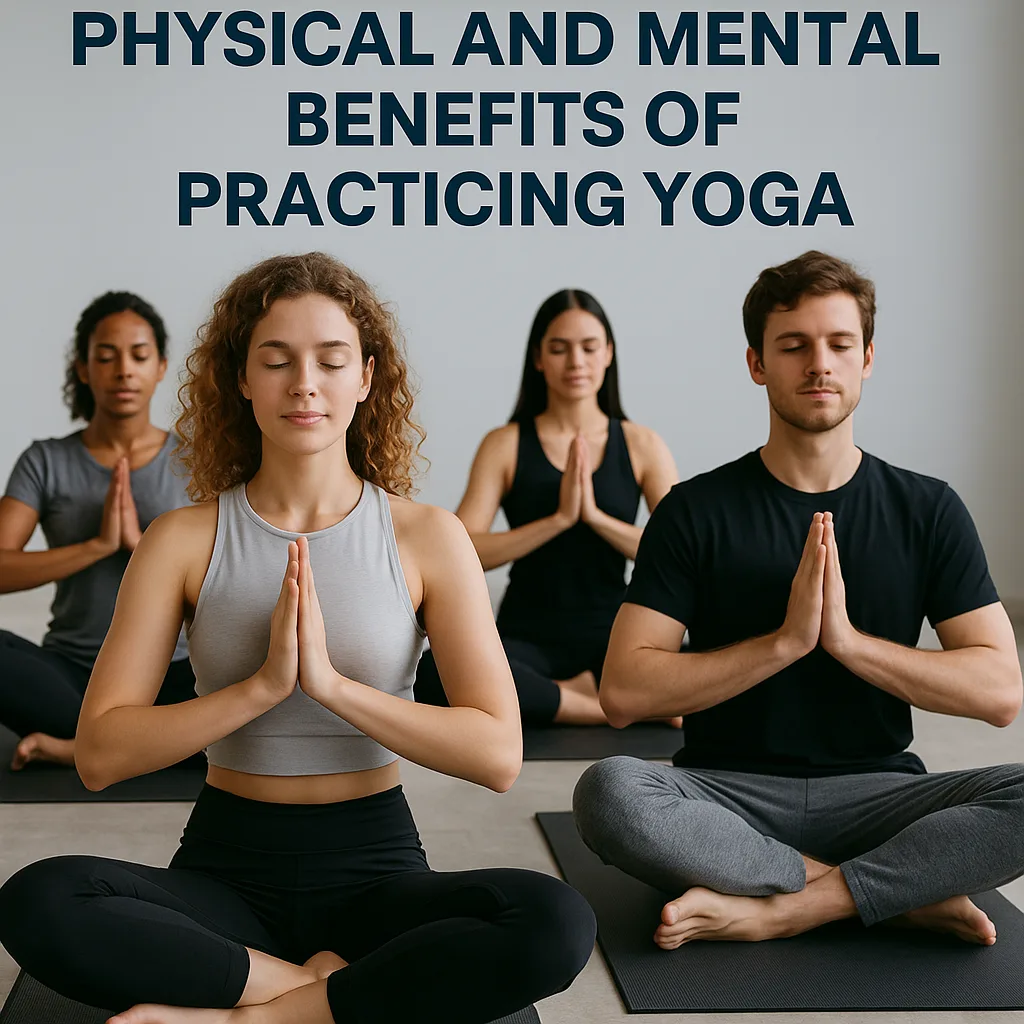Physical and Mental Benefits of Practicing Yoga
In today’s fast-paced world, maintaining a balance between the body and mind has become more important than ever. Yoga, an ancient practice rooted in Indian philosophy, offers a holistic approach to achieving physical fitness, mental peace, and emotional well-being. The benefits of practicing yoga extend to people of all ages and lifestyles. Whether you are a beginner or a seasoned practitioner, incorporating yoga into your daily routine can bring transformational changes to your life.
Start your journey with the right gear—explore our premium yoga mats designed for comfort, grip, and durability.
What Is Yoga?
Yoga is much more than just a workout. It is a discipline that unites the physical, mental, and spiritual dimensions of our being. The word “yoga” originates from the Sanskrit word yuj, which means “to unite” or “to join.” Through a series of physical postures (asanas), breathing techniques (pranayama), and meditation (dhyana), yoga fosters inner harmony and balance.
Let’s explore the incredible physical and mental benefits of practicing yoga regularly.
Physical Benefits of Practicing Yoga
1. Improves Flexibility and Posture
One of the most noticeable benefits of yoga is improved flexibility. Poses like Downward Dog, Cobra, and Warrior stretches help loosen tight muscles, tendons, and joints. With regular practice, yoga can correct posture-related problems caused by prolonged sitting or slouching.
2. Enhances Strength and Balance
Yoga builds strength in both large muscle groups and smaller stabilizing muscles. Balancing poses such as Tree Pose or Eagle Pose challenge your body to develop core stability and muscular endurance. Over time, this leads to better coordination and control over body movements.
3. Boosts Respiratory Health
Breathing exercises, or pranayama, increase lung capacity and oxygen intake. Deep, conscious breathing helps improve blood circulation and energizes the body. It’s especially beneficial for those with asthma or other respiratory issues.
4. Aids in Weight Management
While yoga may not burn as many calories as high-intensity workouts, it encourages mindfulness, reduces stress eating, and boosts metabolism. Power yoga or Vinyasa can provide a cardio-style experience, contributing to healthy weight loss and maintenance.
5. Supports Heart Health
Studies have shown that yoga helps lower blood pressure, reduce cholesterol levels, and decrease heart rate. These changes support cardiovascular health and lower the risk of heart disease.
6. Improves Digestive Function
Poses like the Seated Twist and Wind-Relieving Pose stimulate digestion and promote detoxification. Practicing yoga regularly can reduce bloating, constipation, and improve gut health.
Mental Benefits of Practicing Yoga
1. Reduces Stress and Anxiety
One of the most celebrated mental benefits of yoga is stress reduction. Mindful breathing, meditation, and slow movement calm the nervous system and promote relaxation. This helps decrease cortisol levels—the stress hormone—leading to a more peaceful and relaxed state of mind.
2. Improves Focus and Concentration
Yoga teaches you to be present. By focusing on breath and movement, it trains the mind to concentrate better. Regular yoga practitioners often report improved memory, clarity of thought, and better decision-making skills.
3. Promotes Emotional Stability
Yoga nurtures emotional awareness and helps in regulating mood swings. Asanas and meditation help balance the endocrine system and release “feel-good” hormones like dopamine and serotonin, which combat symptoms of depression and anxiety.
4. Boosts Self-Esteem and Confidence
Through self-discipline and practice, yoga encourages a strong connection with oneself. It helps individuals become more accepting of who they are, boosting self-image and personal confidence.
5. Encourages Mindfulness
The practice of yoga cultivates mindfulness—a heightened awareness of thoughts, emotions, and surroundings. This mental clarity extends to everyday life, helping individuals handle challenges with calmness and a clearer perspective.
Yoga for All Ages and Abilities
One of the best aspects of yoga is its inclusivity. People of all ages—whether children, teenagers, adults, or seniors—can benefit from yoga. There are different styles suited for different needs:
Hatha Yoga – Gentle and slow-paced for beginners.
Vinyasa Yoga – Dynamic and flowing, great for cardio and flexibility.
Yin Yoga – Deep stretching for connective tissues, perfect for stress relief.
Chair Yoga – For seniors or those with limited mobility.
Power Yoga – For fitness enthusiasts looking for a more intense practice.
Whether you’re aiming to build strength, increase flexibility, reduce stress, or improve overall wellness, there’s a yoga style suitable for you.
Final Thoughts
Yoga is not just a trend—it is a powerful, time-tested practice with immense physical and mental benefits. In a world where stress, poor posture, and mental fatigue are common, yoga offers a peaceful retreat for the body and mind.
With just 20–30 minutes of daily practice, you can improve your health, enhance your focus, and bring emotional stability to your life. No expensive equipment, no gym memberships—just a mat and your willingness to start.
So roll out your yoga mat today and embrace the journey toward a healthier, happier you.





 No products in the cart.
No products in the cart.